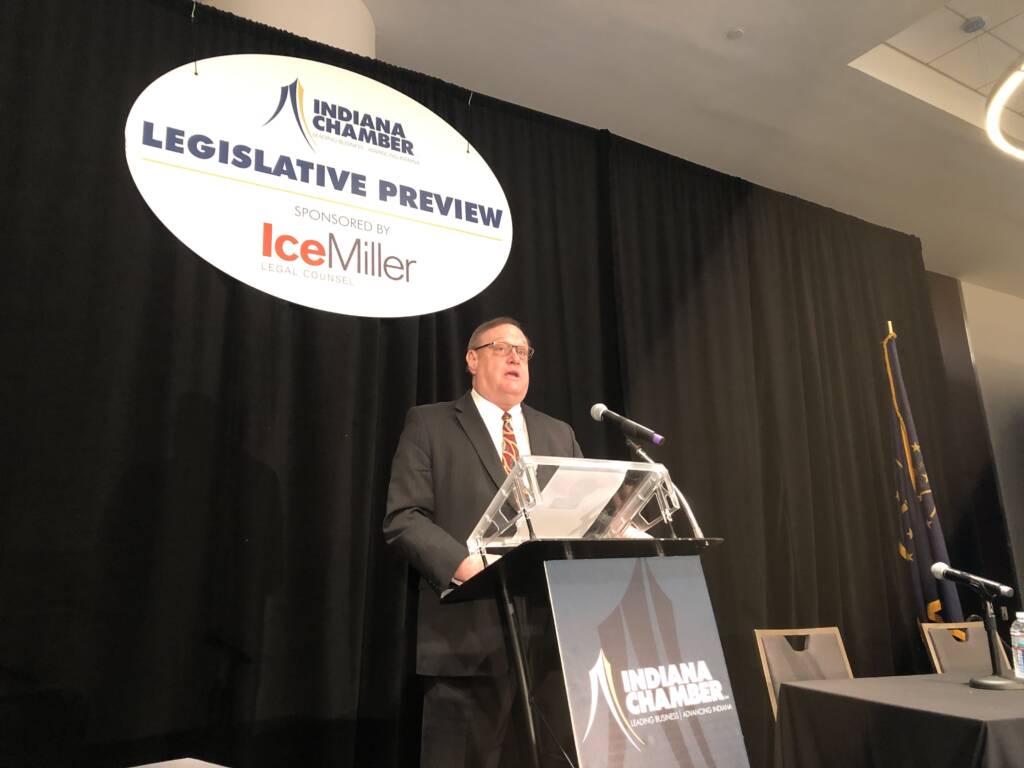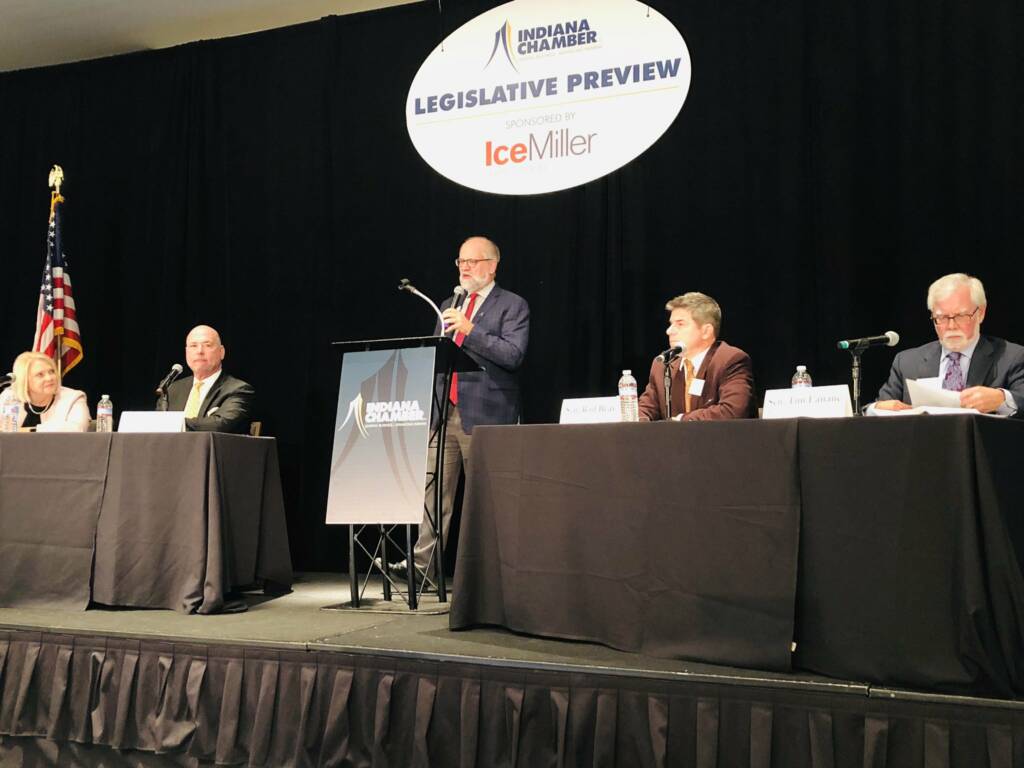The Indiana Chamber continues to emphasize the need for state lawmakers to pass legislation to decrease the smoking rate of Hoosiers and get vaping products out of the hands of young people. We are also promoting talent attraction efforts and development of a state energy plan for the 2020 legislative session
These priorities were among those unveiled earlier this week at our annual legislative preview in Indianapolis. A panel discussion featuring General Assembly leaders from both parties was also part of the event and provided
on-the-spot reaction to our agenda.
Smoking and vaping
We believe raising the age for legal purchase of all tobacco and vaping products, increasing the cigarette tax and taxing e-cigarette products should fall into the no-brainer category.

Indiana Chamber President Kevin Brinegar unveils the organization’s top policy goals for 2020 at the annual Legislative Preview event.
Between 2012 and 2018, vaping usage among Indiana high school students increased 387% and nearly as much among middle schoolers. Smoking causes Hoosier businesses more than $6 billion in annual productivity losses and increased health care costs.
Families are suffering the tragic consequences of these addictions, and just last week we saw the state’s fourth vaping-related death. Voters have already shown strong support for these common sense moves. There is no room for delay or making excuses. The state must step up and address these issues; we can’t wait on or depend on the federal government to act.
The Indiana Chamber was very pleased to see the entire panel want to take action on vaping, with the resounding theme being concern for public health and the realization that vaping is now prevalent among middle-schoolers, in addition to high school students.
House Speaker Brian Bosma (R-Indianapolis) let his desire be known to raise the vaping and smoking age from 18 to 21 and said his caucus is supportive. This is a notable reversal from 2019 when many House Republicans had the opposite reaction. That said, there is no question we have a vaping crisis on our hands now – the full extent of which was unknown last year.
Reading the tea leaves from the panel, taxing vaping liquids, pods and devices has a possibility to take place – and should. The cigarette tax is far less likely. Both Bosma and Senate President Pro-Tem Rod Bray (R-Martinsville) were dismissive because 2020 is not a budget year, with the concern being less people smoking due to the higher cost will lead to less state revenue from the tax.
Meanwhile, Senate Minority Leader Tim Lanane (D-Anderson) and Rep. Terri Austin (D-Anderson), the assistant Democratic floor leader, noted that if it was important enough – and it is – that a cigarette tax increase could take place in 2020.
Austin floated the idea that the Chamber sees as the most viable and one we will be advocating for: Pass the cigarette tax hike now and delay implementation until the budget year.
Talent attraction
A pair of our objectives for 2020 centers around economic development and talent attraction, and acknowledges that Indiana has more job openings than job seekers and the state’s own talent pool isn’t growing quickly enough.
Unfortunately, Hoosier employers are routinely missing out on hiring qualified individuals from other states or countries because of Indiana’s rigid professional licensing laws that essentially demand re-licensing and don’t recognize a person’s existing credential. We believe that unless a license is directly tied to people’s health or safety that our state licensing laws should be eliminated altogether or greatly relaxed.

The caucus leaders discussed what issues need addressing in 2020. From left to right: Rep. Terri Austin, Speaker Brian Bosma, moderator Tom Schuman of the Indiana Chamber, Senate President Pro Tem Rod Bray and Senate Minority Leader Tim Lanane.
Speaker Bosma concurred during our preview, noting that more license reciprocity, where appropriate, with other states needs to occur to help employers fill the hiring gaps. He announced the House will have legislation to do that in 2020.
Another target area is boosting regional economies. A recent Indiana Chamber Foundation employer workforce survey underscored how important quality of place is for job-seekers. Nearly half of the employers surveyed said applicants were not attracted to the community where the company was located.
The best way to grow regional economies and support local communities is by giving elected officials fund-deploying capabilities and letting local taxpayers hold them accountable. Therefore, we support empowering local communities in regions across Indiana to come together to create regional management authorities.
This approach would incentivize local elected officials and business leaders to collaborate more and consider strategic investments for their regions that make them more attractive places to live, work and play.
Bosma harkened back to the Regional Cities program pushed under then-Gov. Mike Pence; he called it a good first step and this idea of regional cooperation to better themselves and the area one that continues to be valuable.
Education and energy
Ensuring high school students have access to financial aid is also on the Indiana Chamber’s agenda. Specifically, we want to require most high school seniors to complete the Free Application for Federal Student Aid (FAFSA) form. Indiana lags behind its Midwestern peers in FAFSA filings, ranking 34th among all states.
Right now, students are leaving money on the table. We want as many students as possible to have the opportunity to earn industry-recognized credentials and degrees with reduced or no debt. This concept is something we believe the General Assembly should overwhelmingly support.
Turning to energy, businesses are the state’s largest consumers, so this issue is top of mind. As a state, we need to have a strategy in place to assure that we can continue to deliver energy to workplaces and residences that is adequate, reliable, affordable and cost-effective. The General Assembly and Governor have started work on this, but much more needs to happen.
The Chamber will be conducting a comprehensive study of the issue in 2020 and will be able to provide additional insight into where the state stands now and where it needs to be in the future with resources and demands.
Our entire list of top legislative priorities:
- Addressing the vaping dangers and reducing the state’s smoking rate by increasing the legal purchase age on both from 18 to 21, as well as instituting a tax on vaping products and increased tax on cigarettes
- More transparency in health care costs and lessening the incidence of “surprise billing”
- Unemployment insurance tax liability certainty for employers while also ensuring fund solvency
- Reducing or eliminating unnecessary professional licensing requirements that can hinder talent attraction
- Create regional management authorities across the state to boost quality of place funding to make local communities and economies more vibrant
- Development and implementation of a diversified energy policy that ensures the state’s continued access to adequate, reliable, affordable and cost-effective energy
- Strengthening Indiana’s high school accountability system to provide greater transparency and comparability for parents and more meaningful outcomes for students
- Requiring Indiana high school seniors to complete the FAFSA – with an opt-out option – so more receive financial aid and pursue credentials and degrees
- Significant investment in Indiana’s water infrastructure and prudent planning for the future
A detailed rundown of our 2020 key legislative initiatives (priorities and additional areas of focus) is available at www.indianachamber.com/priorities.
Resource: Kevin Brinegar at (317) 264-6882 or email: kbrinegar@indianachamber.com


